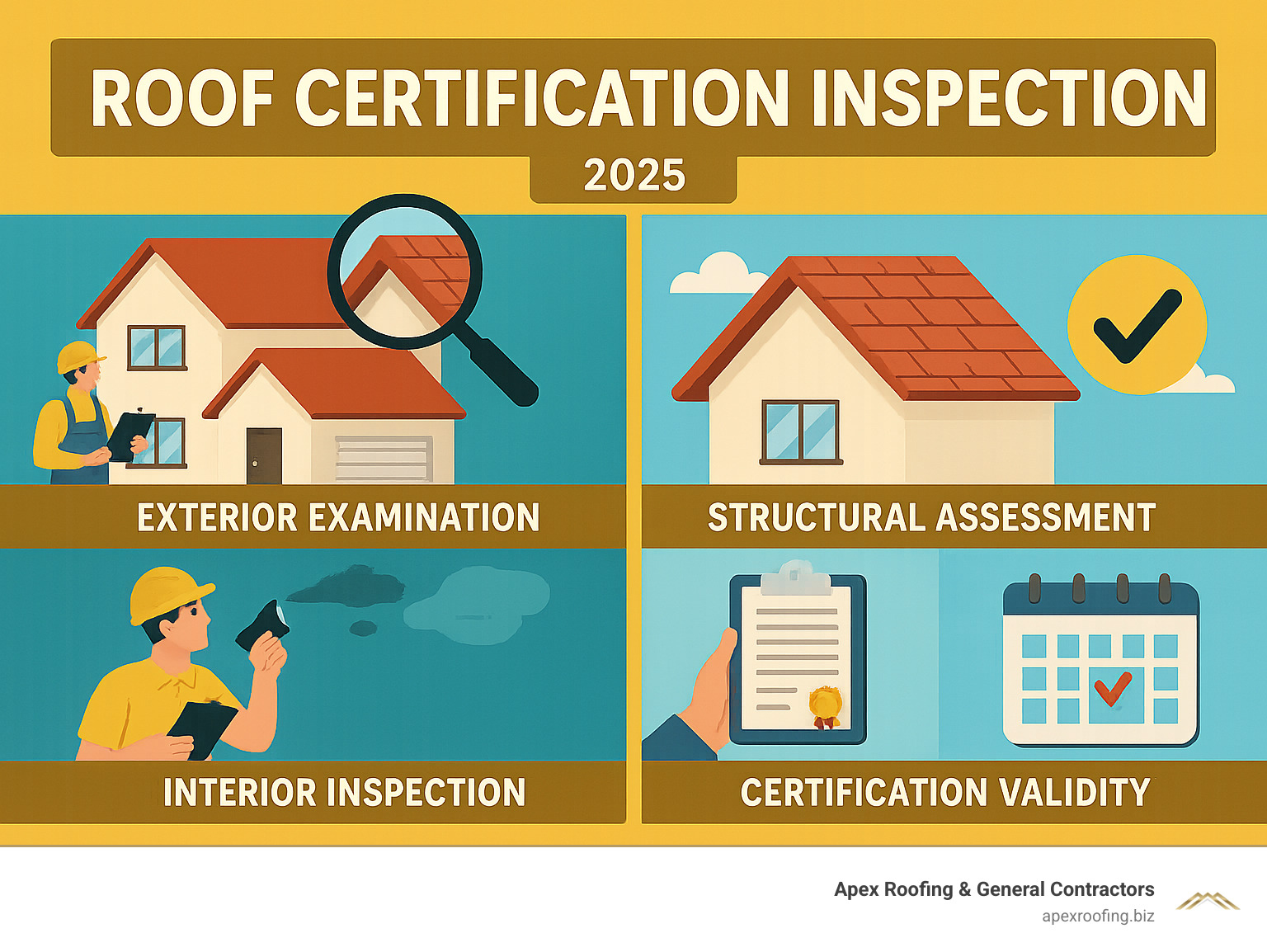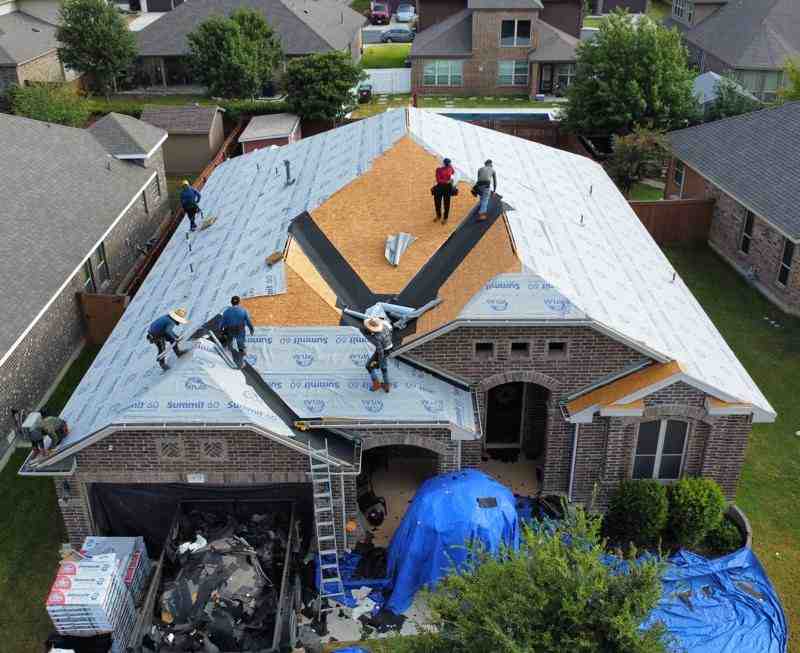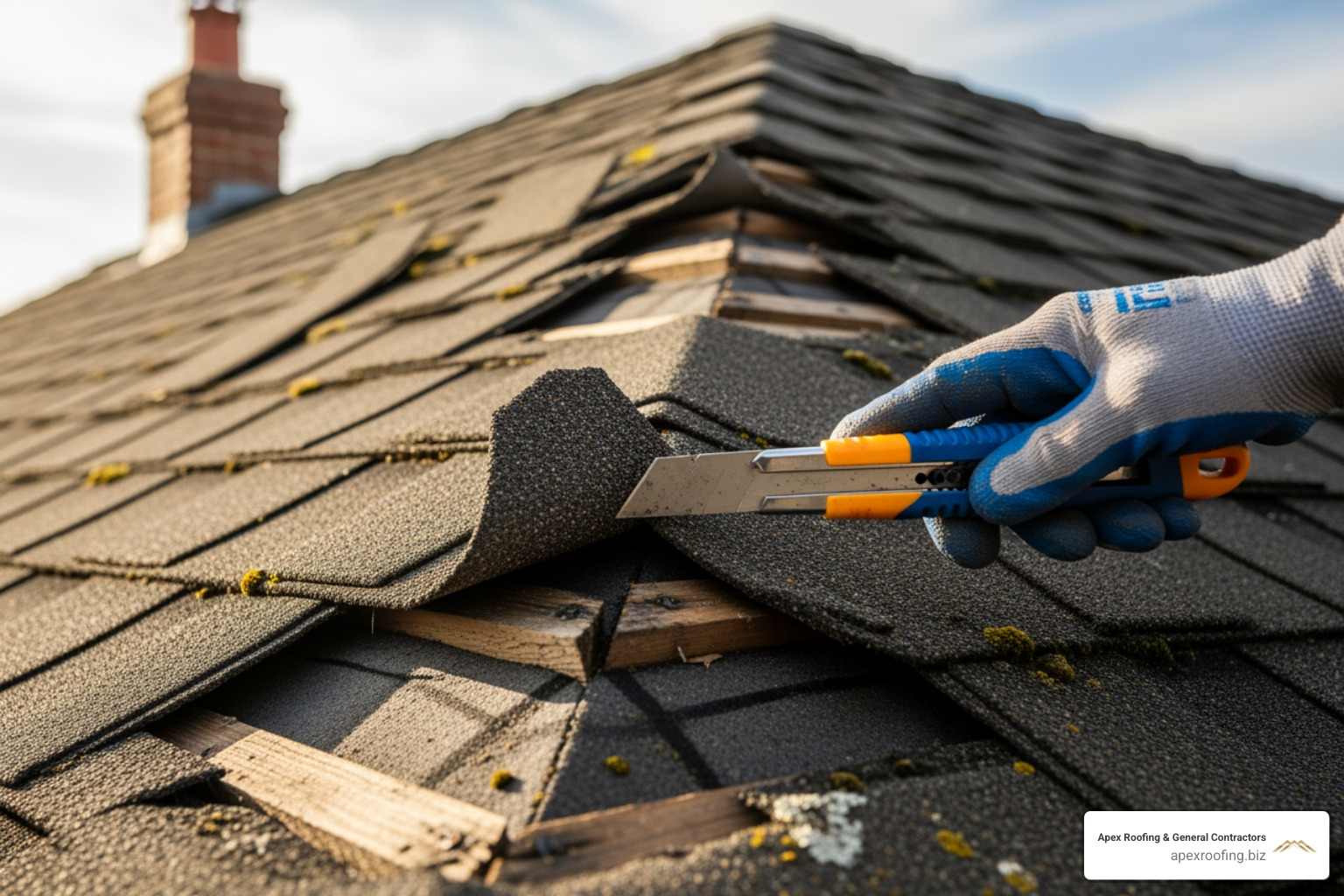Why Roof Certification Inspections Matter for Your Property
When buying or selling a property, navigating insurance policies, or simply ensuring the long-term health of your home, the roof is a top priority. A roof certification inspection provides a professional, written assessment of your roof’s current condition and its expected lifespan. This formal evaluation is more than a simple check-up; it’s a guarantee that your roof will perform as expected for a specified period, offering a critical layer of security for your investment. For homeowners across Bexar County, partnering with a trusted San Antonio roofing company is the first step toward securing this vital protection and peace of mind.
This certification is a formal document issued by a qualified professional, confirming that the roof is free of defects and should remain leak-free for a set term, typically between two and five years. Beyond day-to-day peace of mind, certifications are often required for home sales, insurance renewals, and mortgage underwriting. In fast-moving markets around San Antonio, Helotes, Leon Valley, Alamo Heights, Fair Oaks Ranch, Shavano Park, and Terrell Hills, having certification in hand can prevent surprises and delays.
Key aspects of roof certification inspections:
- Purpose: To formally verify the condition of a roof and provide a written guarantee of its performance against leaks. This goes beyond a standard inspection report by adding a layer of liability and assurance from the inspector.
- Duration: The certification is typically valid for 2-5 years. The exact length depends on the roof’s age, material, current condition, and the inspector’s professional judgment.
- Cost: The cost for a certification inspection usually ranges from $75 to over $200. This price can vary based on the roof’s size, pitch, complexity, and your specific location.
- Requirements: To be considered valid by lenders and insurance companies, the inspection must be performed by a licensed roofing contractor or a certified roof inspector. Their expertise ensures a thorough and credible assessment.
- Benefits: This document is often required for real estate transactions (especially for FHA and VA loans), for obtaining or renewing homeowners insurance policies, and for maintaining certain roofing warranties.
It’s essential to understand that the difference between a standard inspection and a certification is crucial. A regular inspection identifies existing or potential problems and provides recommendations. A certification, however, provides a formal guarantee of performance. Insurance companies, particularly after severe weather events or for roofs over a certain age, increasingly require certifications to mitigate their risk. For additional context on how insurers evaluate roof risk in Texas, you can review guidance from the Texas Department of Insurance.
As Carlos Yzaguirre, President of Apex Roofing & General Contractors, I’ve guided countless San Antonio homeowners through the roof certification inspection process since co-founding our company in 2022. Our extensive experience with both residential and commercial properties across Texas has repeatedly shown that proper certification is an invaluable tool. It can prevent last-minute closing delays, save thousands in potential insurance disputes, and provide homeowners with the confidence that their property is properly protected.
When to Schedule a Certification in Bexar County
- Before listing your home to smooth negotiations and satisfy lender or buyer requirements.
- When renewing or shopping for homeowners insurance, especially for roofs 10+ years old.
- After hail or wind events once repairs are complete, to document condition and readiness.
- Before installing rooftop equipment (solar, HVAC, satellite) to verify the roof can support modifications.
What a Certification Does and Does Not Cover
- Certifications guarantee leak-free performance under normal weather conditions for the specified term. They do not cover damage from extreme events (hurricane-force winds, large hail beyond manufacturer ratings), neglect, unauthorized alterations, or foot-traffic damage after issuance.
- If issues are found during the evaluation, your inspector will outline required repairs. Once corrected by a licensed contractor, the roof can be re-inspected for certification.
How to Prepare for a Smooth Appointment
- Ensure safe access to the roof and attic; clear personal items that block attic entry.
- Have documentation ready: previous repair invoices, roof age, material type, and warranty paperwork.
- List any prior leaks or problem areas so the inspector can pay special attention to them.

Roof Inspection vs. Roof Certification: What’s the Difference?
Many homeowners use the terms “roof inspection” and “roof certification” interchangeably, but they represent two distinct services with different goals, outcomes, and legal implications. If you’re unsure about the difference, you’re not alone. Understanding this distinction is key to making informed decisions that can save you significant time, money, and stress, especially during real estate transactions or insurance renewals.
Here’s a simple way to think about it: a standard roof inspection is like a doctor’s check-up that diagnoses current health issues. A roof certification inspection is like a health certificate that formally attests to the patient’s good condition for a specific period. Both involve a thorough examination, but one reports on findings while the other provides a guarantee.
At Apex Roofing & General Contractors, we spend a great deal of time helping San Antonio homeowners steer this confusion. The fundamental difference lies in commitment and liability. An inspection informs you of what’s wrong; a certification provides a professional promise that things won’t go wrong.
| Criteria | Roof Inspection | Roof Certification |
|---|---|---|
| Purpose | Identify current problems, assess condition, and recommend maintenance. | Guarantee the roof’s performance and leak-free condition for a specific timeframe. |
| Outcome | A detailed report of findings, including photos and repair suggestions. | A formal, written warranty against leaks, recognized as a legal document. |
| When It’s Needed | Routine annual maintenance, post-storm assessment, general peace of mind. | Real estate transactions (buyer/seller requirement), insurance policy underwriting, FHA/VA loan applications. |
| Inspector’s Liability | Limited to the accuracy of the reported observations at the time of inspection. | Assumes liability for the roof’s performance against leaks for the duration of the certification period. |
What is a Roof Certification?
A roof certification inspection results in a formal document stating that a professional inspector has evaluated the roof and attests that it is in good condition and will remain free of leaks for a specified period, usually two to five years. This isn’t just a piece of paper; it’s a professional warranty.
When an inspector certifies your roof, they are putting their professional license and reputation on the line. They are making a formal declaration: “Based on my expert assessment, this roof is structurally sound and will reliably protect the home from normal weather conditions.” This certification provides an estimate of the roof’s remaining useful life and delivers a level of assurance that a standard inspection report cannot. It transforms an opinion into a guarantee, giving homeowners, buyers, and insurers tangible confidence in the roof’s integrity.
Key Differences: Standard vs. Roof Certification Inspection
The scope, documentation, and implications of these two services vary significantly.
A standard inspection focuses on identifying current issues like broken shingles, damaged flashing, or signs of wear. The inspector documents what they see at that moment but makes no promises about future performance. It’s a snapshot in time.
A roof certification inspection is a much more rigorous and forward-looking process. The inspector evaluates all the same elements but with an eye toward long-term durability. They are not just looking for existing problems—they are assessing the roof’s overall health and its ability to withstand future weather. This often involves a more detailed examination of workmanship, material quality, and structural components to ensure they meet the standards required for a guarantee.
Documentation also differs dramatically. A standard inspection yields a report with findings and recommendations. A certification produces a formal, often transferable document that insurance companies and real estate professionals recognize as an official guarantee. For real estate transactions, this is a game-changer. While buyers and sellers can negotiate repairs based on an inspection report, a certification can satisfy lender requirements, transfer risk, and provide contractual protection against future leaks.
Insurance companies in areas like San Antonio are increasingly demanding this level of assurance, especially for older roofs or after a major weather event like a hailstorm. They want a professional guarantee of the roof’s condition, not just an opinion, to accurately assess their risk.
When to Choose Each Service
- Choose an inspection if you want routine maintenance insights, a post-storm condition check, or budget planning for future repairs.
- Choose a certification if you are selling or buying a home, renewing insurance on an older roof, or need a formal, written guarantee of performance for the next 2–5 years.
- If the roof does not initially meet certification standards, complete the recommended repairs and request a re-inspection to obtain certification.
What’s Included and Excluded in a Certification
- Included: Confirmation that roofing materials, flashing, penetrations, and transitions are sound; verification of proper drainage; and an estimated remaining service life under normal conditions.
- Excluded: Damage or leaks caused by extreme weather beyond normal exposure, impact from debris, foot traffic, wildlife, clogged gutters, or alterations made after the certification (solar installs, satellite mounts) unless specifically inspected and noted.
Practical Tips for Real Estate and Insurance Timelines
- Schedule the assessment early in your option period to allow time for repairs and re-inspection before closing.
- Keep receipts and photos of any repairs—these documents help insurers and buyers.
- Ask whether the certificate is transferable to a buyer and confirm the exact term (2–5 years) and any maintenance requirements to keep it valid.
Finding a Qualified Inspector
Not every roofer or home inspector is qualified or willing to issue a roof certification. Because it involves taking on liability, only experienced and confident professionals typically offer this service. The inspector must be properly licensed and insured. For homeowners looking to verify credentials, organizations like the National Roof Certification & Inspection Association (NRCIA) provide resources and directories of certified professionals.
If you need more detailed information about what our standard evaluations involve, check out our comprehensive guide on roof inspections. Understanding both services helps you choose the right one for your specific situation.
The bottom line is this: choose a standard inspection when you want to know your roof’s current condition. Choose a certification when you need a professional to guarantee its performance.
Apex Roofing & General Contractors offers free estimates and local expertise across San Antonio and greater Bexar County. Call (726) 727-7663 to schedule a free inspection and get the documentation you need to move forward with confidence.



